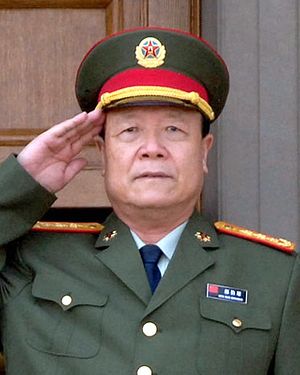On Monday, the Chinese government announced that an old tiger was the latest to be ensnared in President Xi Jinping’s wide-ranging anti-corruption campaign. Guo Boxiong, a former vice chairman of the powerful Central Military Commission and a retired People’s Liberation Army (PLA) general, confessed to taking $12.3 million in bribes. Xinhua, citing a statement from the PLA’s military procuratorate said that Guo was additionally found to “have taken the advantage of his position to assist the promotion and relocation of other people.” Guo stepped down from the CMC in 2012.
The announcement regarding Guo’s past misdeeds is not surprising. Last summer, he became the senior-most military official to be expelled from the Chinese Communist Party since Xu Caihou, another former CMC vice chairman. (Xu died awaiting trial on corruption charges.) Chinese state media reporting echoed the charges that led to Guo’s expulsion from the party nearly verbatim when reporting on his confessions this week. “His acts seriously violated party discipline and left a vile impact,” the CCP Politburo had said at the time. Moreover, Guo’s son, Guo Zhenggang, a PLA general himself and former deputy commissar of the Zhejiang Military Region, had been investigated last year for corruption as well.
The significance of Guo’s prosecution is two-fold. First, Guo held enormous influence over the PLA during the Jiang Zemin presidency. Though Xi Jinping’s anti-corruption campaign has sought to stamp out “tigers and flies” alike (referring to senior and low-level party officials respectively), the “tigers” have often been linked politically to Jiang Zemin. Guo, along with Xu Caihou, benefited from his status as one of Jiang’s close confidants in the PLA. As Bo Zhiyue noted in The Diplomat, both Guo and Xu owed their eventual promotions to CMC vice chairmanships to Jiang.
The fall of Guo Boxiong and Xu Caihou reinforces the idea that Xi Jinping’s anti-corruption campaign–insofar as it has affected the People’s Liberation Army–seeks to strike Jiang Zemin’s lingering influence. In particular, Xi’s resolve to go after Xu and Guo after their retirement sends a powerful signal to other senior PLA leaders from the Hu and Jiang eras, warning them to avoid interfering in the affairs of the PLA past their prime.
The anti-corruption-as-power-consolidation understanding of Xi’s campaign isn’t new. For instance, the fate of other “tigers” that fell to the campaign spurred rumors in China that a motley crew of former officials–some linked to Jiang and others linked to Bo Xilai and the “New Left” in China–was conspiring to undermine and even overthrow Xi’s leadership. Ling Jihua, Zhou Yongkang (the ultimate “tiger”), and Xu Caihou were linked to these conspiracies.
Second, Guo’s prosecution comes at a time of major reform and organizational change to the People’s Liberation Army. The ongoing restructuring was initiated by Xi last fall and represents the most radical rethink of how China’s armed forces are structured since the People’s Republic’s founding in 1949. As part of these reforms, Xi has sought to solidify his personal control over the PLA as commander-in-chief, solidifying the already powerful post of chairman of the CMC. High-level corruption has the instrumentally undesirable outcome of weakening the accountability of senior PLA leadership to Xi’s whims.
With the ouster of Guo and Xu before him, Xi and Wang Qishan, Politburo Standing Committee member and head of the powerful Central Commission for Discipline Inspection, have made it clear that the ‘new’ PLA will not tolerate a senior military leadership that has its loyalties anywhere but the CMC. Learning from Mao’s purges of senior generals during the Cultural Revolution, which has its 50th anniversary next month, Xi understands the value of asserting personal control over the military.

































